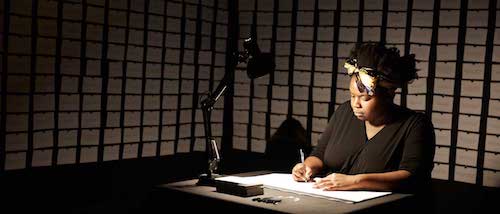 What does it mean to be Black? Is it better to have an ill-informed conversation about race or no conversation at all? How do you feel when you hear (or hear yourself saying) the word diverse? Why did Rachel Dolezal feel the need to be Black- to go one step beyond cultural appropriation into something else? What does the desire to be polite play in racism? What were you expecting from a piece called Race Cards? Selina Thompson, the creator of Race Cards, an ever-expanding installation and archive taking place at The Theatre Centre as part of the Progress Festival, invites you to answer one of the previous questions on race.
What does it mean to be Black? Is it better to have an ill-informed conversation about race or no conversation at all? How do you feel when you hear (or hear yourself saying) the word diverse? Why did Rachel Dolezal feel the need to be Black- to go one step beyond cultural appropriation into something else? What does the desire to be polite play in racism? What were you expecting from a piece called Race Cards? Selina Thompson, the creator of Race Cards, an ever-expanding installation and archive taking place at The Theatre Centre as part of the Progress Festival, invites you to answer one of the previous questions on race.
Walking into the slightly darkened intimate space of the BMO incubator you will encounter one thousand cards hung, parallel to the three back walls, on small chains with little banker’s clips. Each glowing white card contains a question about race. The light reflected on these cards creates a criss-cross shadow on the back of theatre that is extremely striking. At the front of the room there is a desk lit with a lamp and a stack of blank cards and pens.
There is also a sign that tells you that these thousand questions were written down by Thompson across 24 hours over the span of one weekend in Edinburgh. After reading and reflecting on as many of the questions as you would like you are encouraged to answer one and attach your answer to the back of the original question and to copy down a question to take home with you, presumably for further contemplation.
The questions are numbered and by reading them in order you can see the artist’s stream of consciousness. Other than that, they are not ordered by topic or event.
The artist points out twice that these are not meant to be clever questions. Indeed, some of them seem very simplistic yet when you attempt to answer them you find that you may not have a well-contained response or “soundbite.” One example is “Why did [Rachel Dolezal] elicit such horror from some people?” I understand what Dolezal did was very inappropriate but do I really have the language and knowledge to discuss the “wrongness” of her actions or put them in context?
Other questions seem deceivingly flippant, but, turn out to be subtly insightful such as asking what would be served at a dinner party where the guests have been invited to discuss race. Would it be passive aggressive if you served chicken? Would you be a racist if you consciously didn’t? Why would you even think about what you would serve in such politicized terms in the first place?
A portion of the cards are devoted to rhetorical questions such as “What is an appropriate response to somebody telling you that the fact you used to work at KFC is the blackest thing they’ve heard?” It is with such questions that you glimpse Thompson’s anger and frustration.
She is also very introspective and is constantly critically examining her work even as she creates it asking questions such as “How do I balance being angry, Black and a woman with the stereotype of the angry Black woman?” and “Do we make performances and assume our audiences will be White?”
I spent an hour and a half with this installation. We all assume that we are allies when it comes to issues of race and gender yet this work made me realize that I did not know nearly as much as I thought I did and it asked me questions that I had never even considered because I did not grow up having to consistently question systems of oppression or stereotype (I’m not white, but, I grew up in Egypt where I basically looked like everyone else). I found this to be a work of art that is direct, open, seeks to engage in a non-judgmental manner and, despite its creator’s assertions, clever.
Details:
- Race Cards is on until February 11, 2018 at The Theatre Centre (1115 Queen St. West).
- Installation is open Wednesday to Sunday from 2pm to 9pm except on Sunday when it closes at 5pm.
- Admission is free.
- Timed entries throughout open hours, advance registration required.
Photo by Manuel Vason at DARC Media
